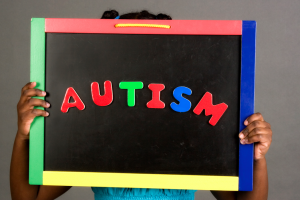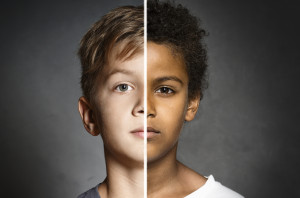
A person with an afro looks sternly at the camera.
Like most people with mental illnesses, I often get a lot of frustrating unsolicited advice thrown at me.
I’m told to socialize more to be less depressed. I’m told to exercise more to get rid of inexplicable muscle pain, caused by anxiety. I’m told to “face my fears” to deal with my PTSD.
This advice might be well-intended – and even possibly helpful in some cases – but when we don’t ask for it, it’s pretty infuriating.
But the most annoying piece of unsolicited advice I’m ever given is to see a therapist.
Hear me out: I think talking to a counselor works for a lot of people. It’s worth trying if you have the opportunity to try it. Therapy has helped me, and I know many people who believe therapy has saved their lives.
When people speak about our traumas and mental health problems, we’re often quick to suggest that they see a therapist.
This advice is given on an individual level and an institutional level. For example, many people talk about mental illness on public platforms like Twitter.
We often talk about it publicly to challenge the silence and stigma around mental health. When I discuss my PTSD or depression online, I’m often told to stop talking about it and instead seek therapy.
At an institutional level, schools, universities, and workplaces often suggest that students or employees see therapists when they’re struggling with mental health. Sometimes, they suggest that we see therapists in order to avoid providing support to mentally ill students and employees.
For example, some universities refuse to use trigger warnings, saying that students should seek therapy if they’re triggered by course material.
Why this advice annoys me is because it’s often accompanied by the assumption that therapy is simpler than what it is.
It often assumes that therapy is accessible to the person we’re talking to, and that therapy will actually work for the person we’re talking to.
The truth is that, for most of us, seeing a therapist isn’t that simple.
Encouraging someone to see a therapist can be a really well-intended, useful way to support them. But we need to remember that it’s a simple solution to mental illness. Here’s why.
1. Seeing a Therapist Isn’t Accessible to Everyone
Let’s face it: Mental healthcare isn’t cheap. At least, it’s not cheap in most parts of the world.
In my town, the cheapest therapist I can find costs a quarter of my rent per hour. If I see them for one hour each week, therapy will cost roughly as much as my rent. There’s no way I could afford that. Like many other people, I don’t have any form of medical insurance – not that insurance always covers therapy.
Luckily, government facilities are available in my area, but seeing a counselor often entails a long waiting list and jumping through many administrative hoops. Many mentally ill people don’t have the time or energy for that.
I’m still more privileged than most people in my community. I can access these government facilities easily because I can pay for transportation to get there. For those who can’t, and for those who don’t have access to a car, this is even harder.
Of course, my anecdote doesn’t represent what mental healthcare is like all around the world. Government care programs differ everywhere.
But the bottom line is that, for many of us, getting mental healthcare isn’t as simple as going into a clinic and being attended to immediately.
It’s not just about accessing a therapist – it’s about accessing the right one.
The first counselor I ever saw seemed amazing at first. She was the second person I ever told about my assault. She was the first person I ever told about being bisexual. She told me that bisexuality wasn’t real, and that I was actually a lesbian. She believed I was only a lesbian because I was sexually assaulted.
At the time, I was only about 14. I didn’t yet know how to articulate how betrayed I felt, but I knew I needed to stop seeing my counselor. Since I didn’t have access to any other free counselor, it took about five years before I saw another therapist.
I’ve had other therapists who victim-blamed me or made classist comments towards me. Over the years, I learned that being a marginalized person meant that I’d struggle to find a therapist that was fully accepting and non-judgmental towards me.
Unfortunately, there are a lot of therapists out there who hold a lot of bigoted ideas – ideas that can badly impact their clients.
So for those of us with multiple marginalized identities, finding therapy is even harder. This means that more privileged people will struggle less to access a therapist that doesn’t perpetuate oppression against them.
Once again, finding a therapist that works for you is difficult, and it’s easier to shop around for a therapist when you have enough money or a healthcare plan to pay for expensive private care. You also can look around more when you have a car, a flexible schedule, and reliable childcare – all things that you’re more likely to have if you hold privilege.
The bottom line is that therapy isn’t as accessible as we’d like to imagine.
In this light, “just see a therapist” is a piece of advice that ignores the fact that accessing a therapist is seriously tricky.
2. Seeing a Therapist Doesn’t Work for Everyone
Therapy can be super helpful for many people, but there are also plenty of people who don’t find therapy helpful.
I worry that when we offer unsolicited advice to people, saying they should “just see a therapist,” we’re assuming everyone finds therapy beneficial. When we make that assumption, we erase those people who don’t benefit from therapy.
I know of many people who felt like something was wrong with them because they didn’t benefit from therapy.
In some cases, people aren’t benefitting from therapy because they aren’t in a good space, or because their therapist simply doesn’t work for them.
When people are in this situation, it might be useful for them to seek another counselor or return to counseling when they feel ready to do so – but if they have limited time, money, and energy, it’s understandable if they can’t do either of those things.
3. Seeing a Therapist Isn’t a Cure-All
Let’s say you’re able to see a therapist, and it does help you.
That’s awesome! But it doesn’t automatically make your mental illness go away.
For most of us, healing takes a really long time, and it’s a complicated process.
In the case of the troll who told me to go to therapy instead of tweeting about my mental illness, my first thought was, Why are they mutually exclusive? Why can’t I tweet about dealing with PTSD while seeing a counselor?
Why do trolls respond to people discussing relapses and day-to-day struggles with mental health by telling us to seek counseling?
When people draw attention to the importance of trigger warnings and content notices, why do people respond by saying people who get triggered should go to therapy? Do people not think it’s possible to still be triggered by certain things while seeing a therapist?
Maybe it’s partially because many people think therapy will fix everything. They might not say it aloud, but that’s the assumption they make.
People who are in therapy might still struggle. People who are in therapy might still have bad days. People who are in therapy might still need other forms of support and healing. In fact, therapists often try to teach their clients how to find a variety of management and coping systems.
Whether they’re in therapy or not, they deserve to have their feelings validated.
***
Therapy can be a really helpful tool in healing from trauma and managing mental health issues, and I encourage people to try it if they can.
But the truth is that seeing a therapist isn’t as easy as we think, and the idea that seeking therapy is simple relies on a lot of false assumptions.
That’s something we have to keep in mind when we recommend therapy to others.
[do_widget id=’text-101′]
Sian Ferguson is a Contributing Writer for Everyday Feminism and full-time freelance writer based in South Africa. Her work has been featured on various sites, including Ravishly, MassRoots, Matador Network, and more. She’s particularly interested in writing about queer issues, misogyny, healing after sexual trauma and rape culture. You can follow her on Twitter and Instagram. Read her articles here.
Search our 3000+ articles!
Read our articles about:
Our online racial justice training
Used by hundreds of universities, non-profits, and businesses.
Click to learn more
Most Read Articles
- « Previous
- 1
- …
- 30
- 31
- 32



















